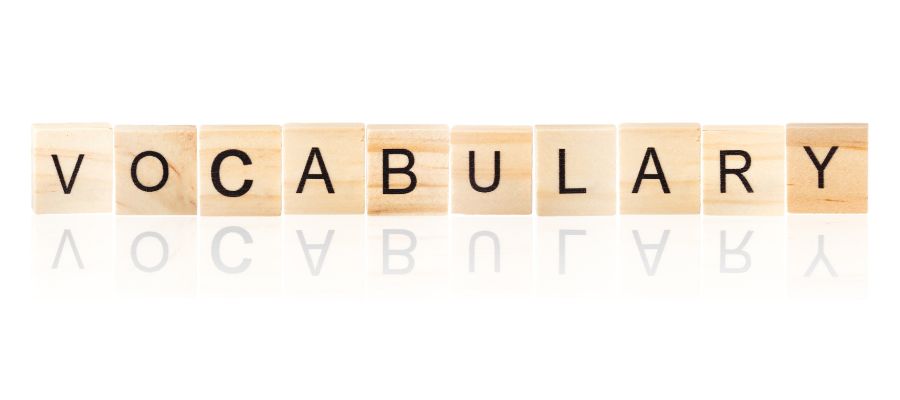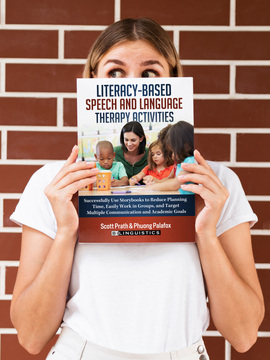There is continual and needed debate in the field of speech language pathology about which language tests to use, in which situation, when to include standard scores, and in which testing circumstances should standardized tests be avoided. Yay speech pathologists for seeing that one-size doesn’t fit all!
However, there is a specific debate that is causing, shall we say, commotion? And that’s whether one-word vocabulary tests should be used at all! Pretty strong words and begs the question as to why they continue to be such a big part of our industry if they are detrimental to qualifying a child.
We want to weigh in here because rather than villainizing something that may have once benefitted evaluators and still does in certain situations, it’s better to understand why they may not be the best choice. Let’s start with talking about the appeal of single-word vocabulary tests and then share five reasons they might not be the best option.

The Allure of Vocabulary Tests
Let’s pretend we are on a committee to develop a new language test. You, brave and seasoned SLP, live in the real world. You have been invited to join the committee because the developers want to make sure that it is loved and usable by everyone with real caseload sizes, in real situations. Here is a list of requirements that I think you would readily endorse. This fantastic test:
- Is easy to administer
- Takes less than 15 minutes
- Is super easy to tabulate and score
- Expressive and receptive tasks are decisively divided up
- The students get what to do without much explanation
- Teachers understand the test and the results match what they are trying to improve
- Parents understand the results
- Writing up the results is fast and straight forward
Sign me up, right? Given the chance, every analysis of language would be that easy. I will add one more here that hints at how single-word vocabulary tests came into existence: vocabulary levels correlate with academic outcomes and abilities. And isn’t our job to support the classroom?
6 Reasons One-Word Vocabulary Tests Are Not Your Best Choice
Alas, if it were just that easy. So it’s important to remember that the developers of these tests are actually on our side, maybe more than most test developers. However, we have many testing situations where single-word vocabulary tests are not going to get us the information we need to make a diagnosis. Here are a few to consider.
1. They Don’t Reflect Actual Language Use in Context
Single-word vocabulary tests are under the same fire that single-word articulation tests are; that they don’t address communication in any context. This is problematic because the reasons referrals are made and the reasons we would diagnose a language disorder are all based on language use. This is probably the strongest of these arguments because there is research to suggest that performance on vocabulary tests is not a good predictor of language abilities.
2. You Still Have to Do Other Standardized Testing
So let’s say you have your results from one-word vocabulary testing. Then you…? You do more standardized and non-standardized testing. The single-word tests would never give you enough information to describe language abilities. Even when I received tests from other SLPs that used standardized vocabulary tests and informal measures, I had a really hard time coming up with goals without doing more dynamic assessment to figure out what to work on.
3. If You Are Truly Curious About Vocabulary Issues, You Can Use a Language Evaluation Subtest
Just for argument’s sake, let’s say that a referral is drenched in vocabulary concerns and you really want scores there. There are other standardized tests like the CELF and PLS that have independent vocabulary measures as part of the expanded testing that we can use to get to the bottom of those concerns.
We hear about vocabulary a lot because it is supremely important to general education. But is it important to our diagnosis? Yes, if we are writing semantic goals. But those are usually enveloped in narrative goals which takes us full circle back to use.
Here are some examples from our speech therapy goal bank:
Expressive Language Goals – Vocabulary Development
- Will describe objects/pictures by identifying 2-3 critical features
- Will describe 20 common objects by giving name, attribute (color, size), function, or number with one request/question
- Will label [common objects/nouns/actions] in [a phrase/sentence/conversation]
- Will use vocabulary to clearly describe ideas, feelings, and experiences
Expressive Language Goals – Narrative Development
- Will use descriptive language to tell stories
- Will tell a story from the past including [#] details in the right order
- Will use appropriate descriptive words to report an event/story
- These are appropriate vocabulary goals. But you couldn’t get to them from vocabulary testing. You would need to dive into story-telling.
4. Second Language Acquisition Can Look Like Lower Vocabulary
Simply stated, if you test a bilingual child in one language, she will not demonstrate all the vocabulary that she knows because vocabulary use is related to environmental context. Certain words are used at home. Certain words are used as school. There are standardized tests in Spanish, but for every other language you would obtain a limited example of their knowledge.
If you test a bilingual child with a one-word vocabulary test, your results will be questionable at best.
5. High Vocabulary Test Scores Do Not Equal High Language Ability
We end here with the biggest conundrum: kids can do well on vocabulary tests and still need language therapy.
Students who struggle with language use can fair well on vocabulary tests. All students have a lot of experience naming images so the process of a taking a single-word vocabulary test is pretty familiar to them. Second, think about the number of language goals that we write that have to do with language use. I would say that nearly all language goals focus on use and vocabulary tests don’t give us any of this information.
6. Vocabulary Tests Measure the Words a Child Has Acquired Thus Far
Every child we test shows up having had different experiences in their home lives and educational settings. As a result, they have different vocabulary. If our test includes words they’ve learned, great for them. If it doesn’t include words they’ve learned, too bad for them. But really, we’re not interested in the words they showed up with. We’re interested in whether they can learn new words. We’re diagnosing a language learning disorder not limited past exposure to vocabulary. Teaching non-words can be a great way to do this or teaching specific vocabulary in the context of a story and then looking at the child’s ability to learn and retain those words.
To sum things up, there is an allure to using vocabulary tests but three inherent problems result from their use: Subpar results don’t definitively diagnose a language disorder. Results within normal limits do not rule out a language disorder. Testing of bilingual children with vocabulary tests yield questionable results. So ultimately, they don’t check the boxes for the time saving and simplicity that they promised in the first place.
Resources:
Conceptual Scoring and Classification Accuracy of Vocabulary Testing in Bilingual Children




